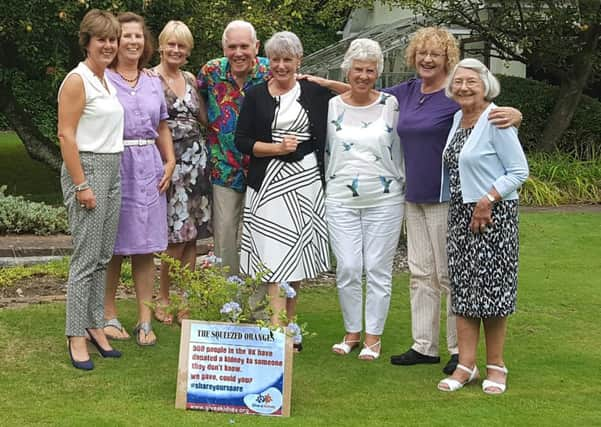QA Hospital leads the way for living kidney donor operations


Today, NHS Blood and Transplant has revealed more than 500 people have given a kidney to a stranger since the law changed a decade ago.
And QA Hospital has conducted one of the highest numbers of the ‘altruistic’ donation operations across the country with 47.
Advertisement
Hide AdAdvertisement
Hide AdThe Cosham site, run by Portsmouth Hospitals NHS Trust, is a regional renal and transplant centre, looking after more than 1,500 patients a year.


Keith Graetz, consultant renal transplant surgeon at PHT, said: ‘We perform an average of 80 to 90 kidney transplants a year.
‘The Wessex Kidney Centre, at QA Hospital, has the largest home-haemodialysis programme in the world and is recognised as a centre of national and international excellence.
‘QA is one of the largest transplant centres in the UK, performing 47 altruistic transplants since the procedure became legal in 2007.
Advertisement
Hide AdAdvertisement
Hide Ad‘The renal and transplantation department is recognised as one of our most important assets, and has a skilled multidisciplinary team of experts across a range of sub-specialties.’


People who have become donors are sharing their stories to encourage others to consider signing up.
Lesley Clayton, from Waterlooville, donated her kidney when she was 47.
Two years on and the 49-year-old said it does not even feel like she has had the operation. ‘It was amazing knowing that someone had benefited from something that caused me very little problems,’ she said.
Advertisement
Hide AdAdvertisement
Hide Ad‘People would never know that I had the operation. It has made little difference to me but has made a huge difference to the person who received my kidney.
‘Being a donor was amazing. There was no detriment to me. It isn’t a small thing that should be decided quickly but it is a huge benefit to someone and can change their life.’
Lesley remains fit and healthy after the operation and said the extensive testing beforehand was a good check-up for her.
‘It was basically like an MoT on your body,’ she said.
‘They check your kidneys but there’s also psychological testing to make sure you fully understand what you are doing and the risks. For me, it was great to know I was as healthy as I felt.’
Advertisement
Hide AdAdvertisement
Hide AdLesley had her operation in November, 2014 and says she recovered quickly and was back at work three weeks later.
She added: ‘There were no complications and afterwards, it was a great feeling knowing I had helped someone.’
Donor Susanne Dadswell felt the same. The 70-year-old donated her kidney three years ago after seeing fellow donor Nicholas Crace on television.
He now runs a group which Susanne and Lesley are both part of called The Squeezed Oranges. All members are altruistic living donors who had their operations at QA Hospital.
Advertisement
Hide AdAdvertisement
Hide AdSusanne, from Emsworth, had a slight complication after the initial kidney surgery but said there were no other problems.
‘I’m proud that I became a donor,’ she said. ‘I’ve been in touch with people at QA who are considering becoming a donor and I tell them my experience. For me, although I did not know more than the person who received my kidney was a man, I imagine him to be surfing on the beach somewhere. That is a lovely feeling.’
Dr Sam Dutta, consultant surgeon at QA Hospital, said using a kidney from a living donor has many benefits
‘We know from numerous studies that a living donor kidney performs better, works quicker and lasts longer,’ he said.
Advertisement
Hide AdAdvertisement
Hide Ad‘All the detrimental factors related to being on dialysis, leading to early death because of heart problems, are completely taken care of by a good functioning kidney.
‘An altruistic donor coming forward is an amazing thing for us. The recipient gets a new lease of life.’
Trish Bailey, from Denmead, gave her kidney last year. She and her husband always wanted to be donors but when he died, the medication he was taking meant his organs could not be used.
So the 71-year-old decided to become a living donor.
She said: ‘I wanted to help someone while I was healthy enough to do it.’
Advertisement
Hide AdAdvertisement
Hide AdThe Squeezed Oranges, based in Portsmouth, promotes altruistic living kidney donation and also guides and counsels those thinking about becoming a donor.
In 2012, Nicholas Crace, from the group, became the oldest living person to donate a kidney, aged 83. The now 87-year-old, from Overton, said: ‘Donating a kidney was made easy by the magnificent renal transplant unit at QA.
‘They made us feel part of a team, all working hard for several months to achieve a successful transplant.’
Jane, 83, would tell people ‘just go for it’
FOR 83-year-old Jane Shorrock giving a kidney was something she did not even have to think about.
Advertisement
Hide AdAdvertisement
Hide AdThe Emsworth resident became an altruistic kidney donor last year after getting in touch with Queen Alexandra Hospital.
After going through rigorous testing, she was given the green light and in May last year she underwent surgery to give her kidney to a man in his 60s who had been on dialysis for a lengthy period of time.
Jane said: ‘My son was in an accident in his teens and lost a kidney so it is something I have always been aware of.
‘I saw some information and went to QA who explained it all to me.
Advertisement
Hide AdAdvertisement
Hide Ad‘I went through all the tests to make sure I was healthy and that my remaining kidney would be able to function on its own.
‘A short time after registering, I was matched with someone.’
Jane had the operation at QA and recovered without any problems.
‘I was healthy so recovered from the surgery really well,’ she added.
Advertisement
Hide AdAdvertisement
Hide Ad‘It doesn’t even feel like it happened because I have no bodily awareness apart from a scar.
‘I had complete confidence in the hospital and I was very happy that I did it.
‘They go through so many tests to check you will be okay so there weren’t many worries.’
Jane said if people were considering becoming a donor, she would tell them ‘just go for it’.
‘Benefits of transplant are life-changing’
Advertisement
Hide AdAdvertisement
Hide AdDAD-of-three Simon Bornhoft said he cannot express enough how much his life changed when he got a new kidney.
The 51-year-old needed a transplant and was given a kidney by his sister 13 years ago. But he needed a second transplant and underwent the surgery at Queen Alexandra Hospital.
He wants to encourage more people to become living donors because of the difference this can make to others.
Simon, from Birdham, near Chichester, said: ‘The benefits you get from a transplant are life-changing. That is no matter what organ you might be getting.
Advertisement
Hide AdAdvertisement
Hide Ad‘I am eternally grateful for that opportunity. It is life-changing to be able to have that opportunity and to be given that feeling that you are healthy again.
‘Feeling like you again is the best feeling.’
Simon is a windsurfing coach and takes part in the National Watersports Festival on Hayling Island.
He added: ‘With modern medicine, if someone is a living donor, the recovery time for them and the recipient is much less and the recovery is easier.
‘Getting a new kidney is like getting a new set of batteries. When you are at end-stage renal failure you are really sick, having a new kidney makes you feel so much better, it can change someone’s life.’
Advertisement
Hide AdAdvertisement
Hide AdLast year, 83 living donors donated a kidney to someone on the National Transplant List.
HOW TO HELP
THOUSANDS of people are on the National Transplant List waiting for someone to donate a kidney.
There are two types of donors, living donors and those who donate organs and tissues when they have died.
A living kidney donor is a person who gives one of their healthy kidneys to someone with kidney failure who needs a transplant. This could be a friend or family member, or someone they do not know.
Advertisement
Hide AdAdvertisement
Hide AdThe NHS says a successful transplant from a living donor is the best treatment option available for most people with kidney disease.
They offer the best opportunity of success as living donor kidneys usually last longer than those from deceased donors.
There is no maximum age limit for people wanting to become a donor. Donors are assessed on their own health and the suitability of the kidney.
Healthy people who wish to help a loved one or a stranger with kidney disease may volunteer to give a kidney.
Advertisement
Hide AdAdvertisement
Hide AdThey will be asked to undertake a series of tests so that the medical team can be absolutely sure that they are suitable to donate.
Tests include:
n Urine and blood tests.
n X-rays and scans.
n Test of kidney function which involves an injection and a series of blood tests over set time periods.
n A psychological assessment to discuss your personal circumstances and any mental health issues.
The assessment process usually takes at least three months.
For more information on living kidney donation contact the living donor co-ordinator or transplant liaison nurse at Queen Alexandra Hospital’s renal unit.
Alternatively, visit odt.nhs.uk/transplantation/transplant-units-in-uk or call 0300 123 23 23.